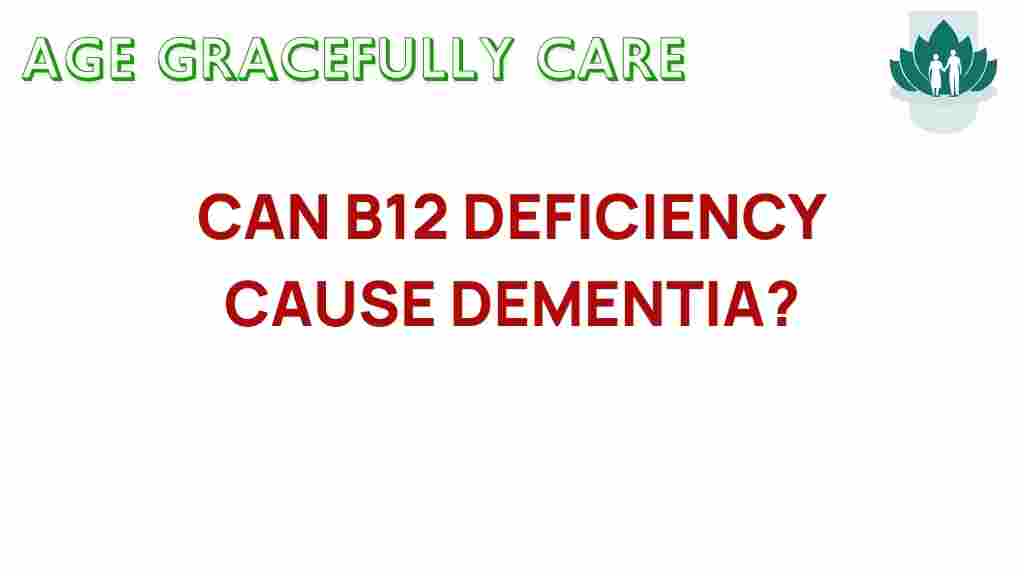B12 Deficiency and Its Link to Dementia
In recent years, the conversation surrounding B12 deficiency and its potential impact on dementia has gained significant attention. As we strive for better cognitive health, understanding the role of vitamin B12 becomes essential. This article aims to unravel the mystery of whether a deficiency in this vital nutrient can trigger dementia and what it means for our brain function and overall neurological health.
Understanding B12 Deficiency
Vitamin B12, also known as cobalamin, is a water-soluble vitamin that plays a crucial role in the production of red blood cells, DNA synthesis, and the proper functioning of the nervous system. A deficiency in this vitamin can lead to various health issues, including:
- Fatigue and weakness
- Anemia
- Neurological changes (numbness, tingling)
- Memory loss
- Cognitive impairments
As we delve deeper into the relationship between B12 deficiency and dementia, it is essential to understand how this vitamin influences brain function.
The Role of Vitamin B12 in Cognitive Health
Vitamin B12 is vital for maintaining healthy nerve cells and producing neurotransmitters that facilitate communication within the brain. Research suggests that adequate levels of B12 are necessary for optimal cognitive function. A deficiency in B12 can lead to neurological disorders, which may manifest as:
- Memory loss
- Difficulty thinking and reasoning
- Changes in mood and behavior
Moreover, studies have indicated that individuals with low B12 levels may be at a higher risk of developing dementia and other cognitive impairments as they age. This correlation poses an essential question: can treating B12 deficiency help mitigate the risk of dementia?
Can B12 Deficiency Trigger Dementia?
The connection between B12 deficiency and dementia has been a subject of extensive research. While some studies suggest a strong link, others are inconclusive. Here’s what we know:
- Inflammation and Homocysteine Levels: B12 plays a role in regulating homocysteine, an amino acid linked to increased inflammation and vascular damage. Elevated homocysteine levels are associated with a higher risk of dementia.
- Brain Atrophy: Research has shown that B12 deficiency can lead to brain atrophy, which is a reduction in brain volume and is often seen in dementia patients.
- Neurological Symptoms: Individuals with B12 deficiency may experience neurological symptoms that resemble those of dementia, such as memory loss and confusion.
While these findings are compelling, it is crucial to understand that B12 deficiency is not the sole cause of dementia. Dementia is a complex condition influenced by various factors, including genetics, lifestyle, and other health conditions.
Recognizing B12 Deficiency
To understand the potential impact of B12 deficiency on dementia, it is essential to recognize the signs and symptoms of deficiency. Common symptoms include:
- Fatigue and weakness
- Pale or jaundiced skin
- Memory loss
- Difficulty walking
- Visual disturbances
If you experience any of these symptoms, it’s crucial to consult a healthcare professional. A simple blood test can determine your vitamin B12 levels and help identify a deficiency.
Step-by-Step Process to Address B12 Deficiency
If diagnosed with a B12 deficiency, here’s a step-by-step approach to address it:
- Consult Your Doctor: Discuss your symptoms and get a blood test to confirm B12 levels.
- Dietary Changes: Incorporate B12-rich foods into your diet. Good sources of vitamin B12 include:
- Meat (beef, liver, chicken)
- Fish (salmon, tuna)
- Dairy products (milk, yogurt, cheese)
- Eggs
- Fortified cereals and plant-based milk alternatives
Nutrition’s Role in Cognitive Health
Nutrition plays a pivotal role in maintaining cognitive health and preventing neurological disorders. A balanced diet rich in vitamins and minerals can help sustain brain function. Here are some dietary tips:
- Eat a Balanced Diet: Include a variety of fruits, vegetables, whole grains, and lean proteins.
- Omega-3 Fatty Acids: Incorporate foods rich in omega-3s, such as fatty fish, flaxseeds, and walnuts, which support brain health.
- Limit Processed Foods: Reduce the intake of processed and sugary foods that may negatively impact brain function.
- Stay Hydrated: Ensure adequate fluid intake to support overall health.
For further insights on nutrition and its effects on cognitive health, check out this comprehensive guide.
Troubleshooting Tips for B12 Deficiency
If you suspect a B12 deficiency, here are some troubleshooting tips to consider:
- Evaluate Your Diet: Keep a food diary to assess your B12 intake and make necessary adjustments.
- Consider Your Lifestyle: If you follow a vegetarian or vegan diet, consider fortified foods or supplements, as B12 is primarily found in animal products.
- Monitor Symptoms: Keep track of any neurological or cognitive changes and discuss them with your healthcare provider.
- Stay Informed: Educate yourself about the symptoms and risks associated with B12 deficiency.
Conclusion
In conclusion, the relationship between B12 deficiency and dementia is complex and still under investigation. While a deficiency in vitamin B12 can lead to cognitive impairments and may increase the risk of developing dementia, it is not the only factor at play. Maintaining adequate levels of vitamin B12 through a balanced diet and, if necessary, supplementation is crucial for supporting brain function and overall cognitive health.
As we continue to unravel the mysteries of nutrition and its effects on neurological disorders, staying proactive about our dietary choices and seeking medical advice when necessary can pave the way for a healthier brain and a reduced risk of dementia.
For more information on cognitive health and dietary strategies, visit our resource page.
This article is in the category Health and created by AgeGracefullyCare Team
